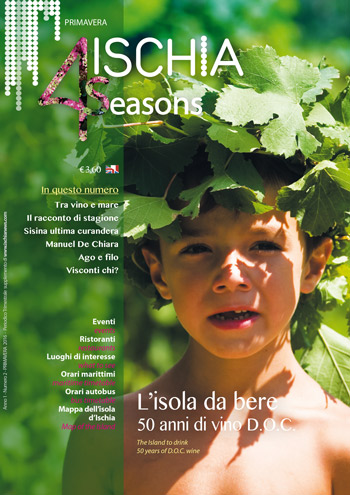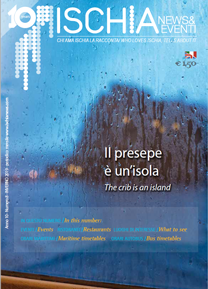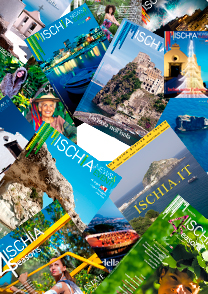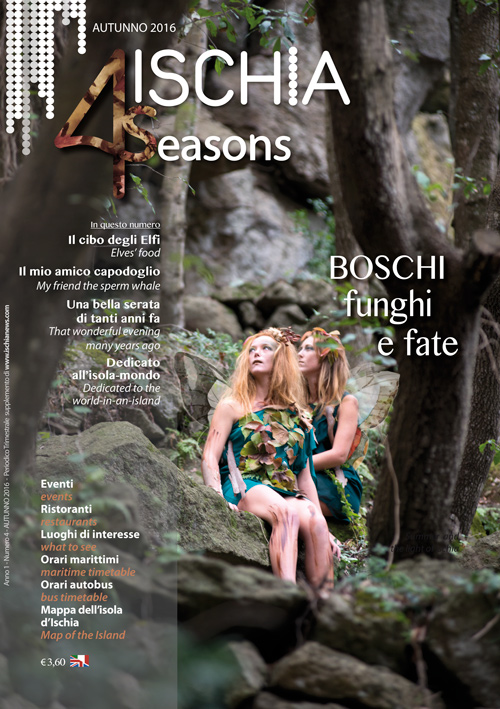Ischia to drink, sips and speeches of love
 Ten years ago, in 2006, Andrea D’Ambra published a book impossible to find, “Storia del vino d’Ischia. La viticoltura nell’isola verde dai greci a Salvatore D’Ambra” (in collaboration with Antonella Monaco), celebrating 40 years since the certification of ‘Appellation d’origine contrôlée’ given to wines of Ischia.
Ten years ago, in 2006, Andrea D’Ambra published a book impossible to find, “Storia del vino d’Ischia. La viticoltura nell’isola verde dai greci a Salvatore D’Ambra” (in collaboration with Antonella Monaco), celebrating 40 years since the certification of ‘Appellation d’origine contrôlée’ given to wines of Ischia.
I wrote a heartfelt epilogue. Ten years later, I am convinced that the half century made by Doc, deserves at least the cover. And, above all, the recovery of that speech. The reason is obvious. The only possible discourse on modernity and our times, is the talking about wine. Because it’s about us. And we talk of wine, when we are about to pour it into the glass. This “vinous word” is the result of one of the largest planetary revolutions: during the hundred years, particularly in the last 30s, wine has become a universal cultural subject. It has not lost its connotation rightly alcoholic, the euphoric identity which had placed the wine at the top of the scale of the myths, and more or less invented traditions that are at the height of Mediterranean civilization. After all, if you drink it, let’s talk more.
It loosens the tongue, doesn’t it? But we need better rules and intellectual capacities, creative (thinking of Plato’s Symposium), to express themselves and live life in common appropriately. Now as three thousand years ago. Because, as then, the wine is rich in powerful meanings. The productive knowledge founded on quality, territories and humanity involved in the socio- economic environment, allows us to forget the quantitative events that had ignored the virtues. Now we have the opportunity to resume the story around its wine making cornerstones, providing to circumvent the banalities. In the beginning was the wine (along with a few other “things”), and it still is. The wild grapes were already transformed in the late Neolithic into Dikili Tash, in eastern Macedonia, but it is in starting of the Bronze Age that the domestication of the vine spreads in Greece. “Wine” is a term that comes from Sanskrit “vein”, which comes in turn from a Proto-Indo- European word: * win-o-. “Vein” means “to love”: the origin of Venus is the same. I will stop here with the etymologies. Back to what we were discussing: Venus and Greece. Even to us.
Taking the example of the absolute icon, the Nestor Cup. For me it is an artifact of play down, releasing dust from the museum, transforming it for fun - at last! - in a duplicate version of Pop Art, as I suggest in charting below. However, on that “kotyle” imported from Rhodes was engraved, scratching the surface of the cup, an epigram in three verses dedicated post-mortem to a boy, which links the power of wine to the strength of the desire for love and Aphrodite, that is, Venus: the first poem passed down as an act of alphabetic writing, in a contemporary period to the composition of the Iliad by Homer. It happened in the eighth century BC, the first Greek colony in the western Mediterranean, inhabited by men, women and vineyards: Pithecusa or Ischia. Where writing, word, wine, Venus and love may continue to be the same and only “thing”.
© RIPRODUZIONE RISERVATA










